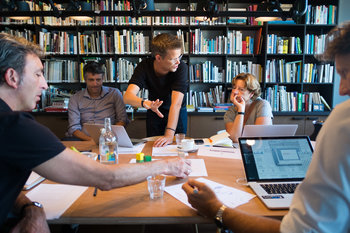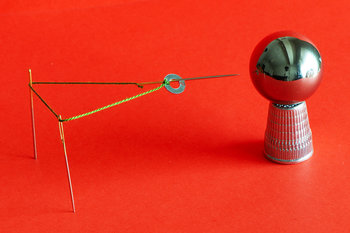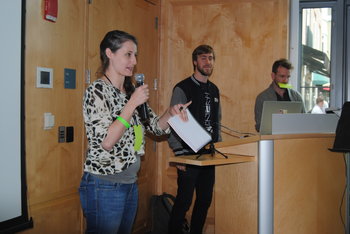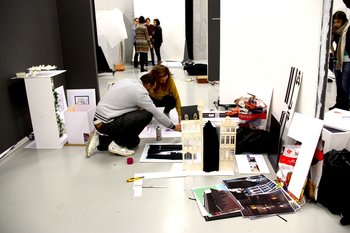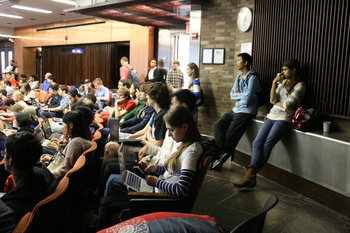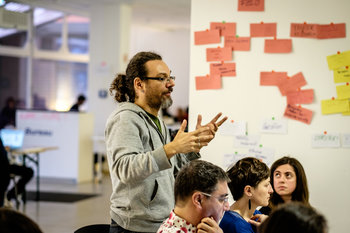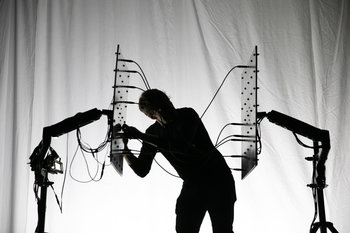
Pragmatism
The philosophy that something is true if it is true for all practical purposes.Rule of Least Power
The principle that you select the least powerful technology that can solve your problems.There's More Than One Way To Do It
The problem solving and design principle that there is no perfect solution just many good solutions.Essential Complexity
The idea that a design be no more complex than required.Less is More
A philosophy of design that states that removing things always adds value. This is ideological and can't be applied to engineering designs where things actually need to be functional.Minimalism
A lifestyle or design based on the principle of less is more whereby removing things becomes a goal in itself.You Ain't Gonna Need It
The principle there is great value to be found in challenging the very assumption that something is needed.Foolproofing
The practice of making user interfaces such that it is impossible for the user to do things wrong.Principle of Least Astonishment
The principle of least astonishment is the guideline that user interfaces work as people expect such that there is nothing to explain.Principle of Least Effort
The marketing and design principle that user interfaces require as little effort from the user as possible. This tends to make products more popular but can also have negative implications such as making them more dangerous.Design to the Edges
The principle that a single design be accessible for as many people as possible. This can be contrasted with the poor practice of designing everything for the mythical average person or designing separate things for each special need.If It Ain't Broke, Don't Fix It
The principle that you fight the common urge to replace or change old things that are working reasonably well. Likely originated as folk wisdom in the American South sometime between 1930 and 1950.Brevity is the Soul of Wit
Keep it simple stupid for communication that suggests that short statements are often more intelligent and effective than long ones. Coined by William Shakespeare.It's the Economy, Stupid
A campaign slogan associated with Bill Clinton's successful 1992 presidential campaign. This is broadly associated with influencing that focuses on people's strongest motivations in a particular situation.Don't Repeat Yourself
A software principle that suggests that each pattern of logic and each item of data exist in only one place. This is wonderful in theory but it is common for architects to create mindlessly complex solutions to try to make this happen.Write Everything Twice
A challenge to the traditional principle of Don't Repeat Yourself that states that architectures are often less expensive and more resilient when they contain redundancies. These contrary approaches are nicely abbreviated DRY vs WET.Paper Prototype
The process of testing your ideas in the fastest, cheapest way possible using an inexpensive prototype.Fail Well
The design of things to fail fast, cheap and safe so that you know if they work without taking much risk. Avoids the common pattern of making things too complex in an attempt to avoid failure.Sanity Check
The practice of taking a step back and asking "does this make any sense at all?"Occam's Razor
The rule of thumb that the theory that makes the least assumptions is often correct. Often misrepresented with popular paraphrasing such as "the simplest explanation is usually right."Perfect Is The Enemy of Good
An aphorism, commonly attributed to Voltaire, that suggests that perfectionism can lead to bad results.Pareto Principle
A common efficiency and productivity heuristic that states that the first 20% of effort often produces 80% of the result. This can be used to argue against the value of perfectionism.Minimum Viable Product
A principle of entrepreneurship and design that you launch a product to the customer as quickly as possible with the minimum set of features that make the product usable.Golden Mean
The idea that the correct path in any situation is a middle path between extremes. This is addressed by both Socrates and Plato and originates in earlier Greek mythology.Simplify Then Add Lightness
A similar principle to KISS that includes the idea of dematerialization whereby things are designed to use less materials and to be lighter. Attributed to Colin Chapman, the founder of Lotus Cars.Path of Least Resistance
The path of least resistance is the easiest path to a goal. This can be problematic.Precautionary Principle
The precautionary principle states that if there is any doubt that a product, chemical, medicine or other product is safe for the environment and people that decisions on whether to launch it to the market must err on the side of caution. This is a simple idea that could have prevented most environmental problems if it had been historically applied.Summary
The following are common examples how to apply the the keep it simple principle: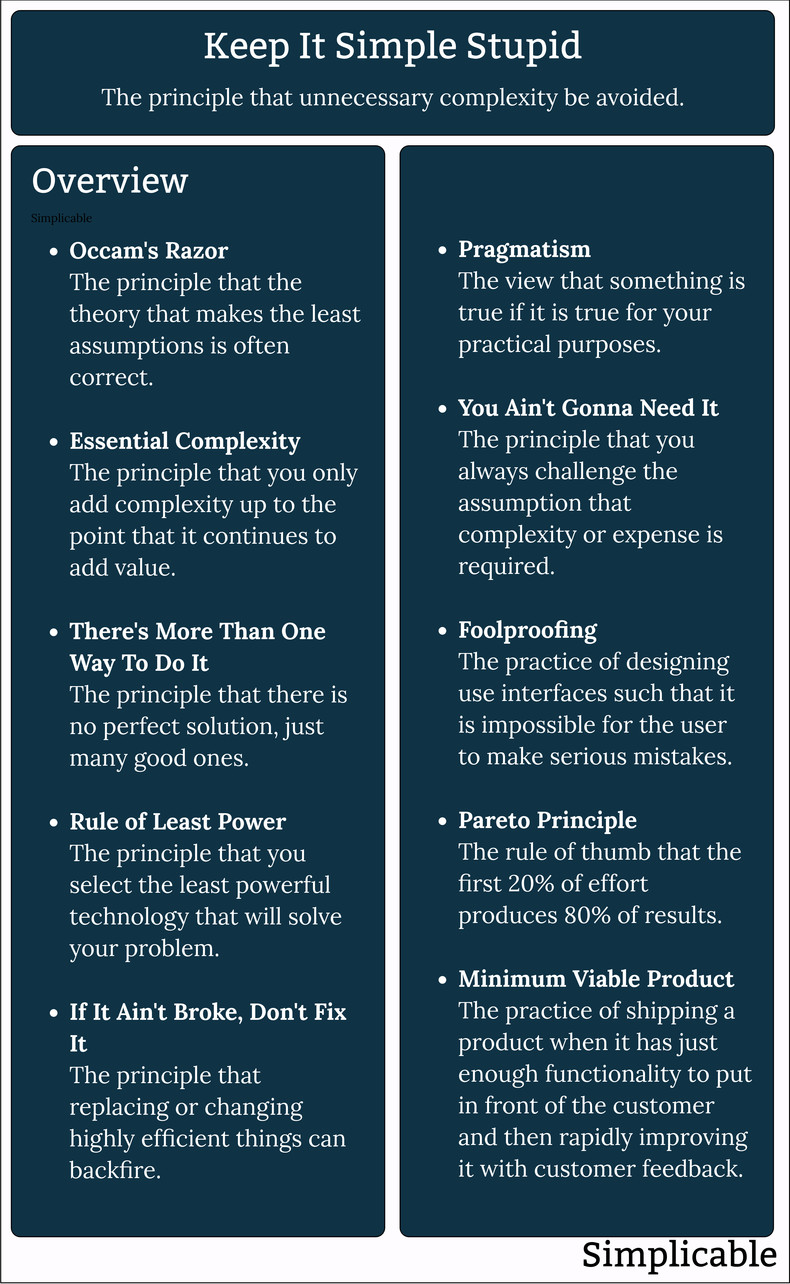
Notes
There are recent efforts to revise or explain away the word "stupid" with overanalysis that suggests the word stupid wasn't meant to apply to a person because the phrase has no comma. This is the exact type of overanalysis the principle is intended to prevent. KISS was meant to be a somewhat humorous phrase. This is consistent with the environment of wit and brash stoicism that was common in American office environments and the military in 1960. Modern alternatives for more sensitive, fragile and delicate environments are "keep it simple" and "keep it simple and straightforward." Many people feel that complexity beats simple. For example, the culture around systems thinking tends to celebrate complexity. As such, KISS should not be considered an unchallenged truism.| Overview: Keep It Simple Stupid | ||
Type | ||
Definition | The principle that the simplest, most direct and lightweight solution is often optimal. | |
Also Known As | KISSKISS Principle | |
Related Concepts | ||
















